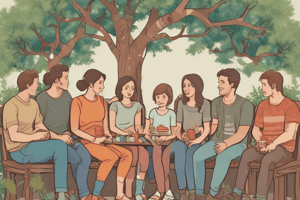Podcast
Questions and Answers
Which of the following social skills is important in family relationships?
Which of the following social skills is important in family relationships?
- Respecting personal boundaries (correct)
- Raising hand and waiting to be called upon
- Using appropriate tone and body language
- Initiating and maintaining conversations
Using respectful language and tone is not important in the classroom.
Using respectful language and tone is not important in the classroom.
False (B)
What is one key social skill to practice during introductions?
What is one key social skill to practice during introductions?
Making eye contact and smiling
In social interactions, reading and responding to _______________________ cues is an important social skill.
In social interactions, reading and responding to _______________________ cues is an important social skill.
Match the following social skills with the situation:
Match the following social skills with the situation:
What is one key social skill to practice in friendships?
What is one key social skill to practice in friendships?
Developing emotional intelligence and empathy is not important in social interactions.
Developing emotional intelligence and empathy is not important in social interactions.
What is one benefit of practicing social skills in the classroom?
What is one benefit of practicing social skills in the classroom?
In family relationships, _______________________ personal boundaries is an important social skill.
In family relationships, _______________________ personal boundaries is an important social skill.
Which of the following is an importance of social skills in introductions?
Which of the following is an importance of social skills in introductions?
Flashcards are hidden until you start studying
Study Notes
Family Members
- Importance of social skills within the family:
- Develops emotional intelligence and empathy
- Enhances communication and conflict resolution
- Fosters healthy relationships and bonding
- Key social skills to practice with family members:
- Active listening
- Expressing emotions and needs
- Respecting personal boundaries
- Cooperation and teamwork
Classroom Etiquette
- Importance of social skills in the classroom:
- Creates a positive learning environment
- Encourages respect and consideration for peers
- Develops teamwork and collaboration skills
- Key social skills to practice in the classroom:
- Raising hand and waiting to be called upon
- Using respectful language and tone
- Following classroom rules and expectations
- Participating in group discussions and activities
Social Interactions
- Importance of social skills in social interactions:
- Builds and maintains relationships
- Enhances communication and understanding
- Develops emotional intelligence and empathy
- Key social skills to practice in social interactions:
- Initiating and maintaining conversations
- Reading and responding to nonverbal cues
- Showing genuine interest and empathy
- Using appropriate tone and body language
Introductions
- Importance of social skills in introductions:
- Makes a positive first impression
- Sets the tone for future interactions
- Develops confidence and self-esteem
- Key social skills to practice during introductions:
- Making eye contact and smiling
- Using a firm but friendly handshake
- Introducing oneself clearly and confidently
- Showing interest in others and asking open-ended questions
Friendship Skills
- Importance of social skills in friendships:
- Builds and maintains strong relationships
- Enhances emotional support and trust
- Develops empathy and understanding
- Key social skills to practice in friendships:
- Active listening and empathy
- Showing genuine interest and care
- Being reliable and dependable
- Resolving conflicts and disagreements in a healthy manner
Family Members
- Developing social skills within the family enhances emotional intelligence and empathy, leading to healthy relationships and bonding.
- Practicing active listening, expressing emotions and needs, respecting personal boundaries, and cooperation & teamwork with family members fosters a positive environment.
Classroom Etiquette
- Social skills in the classroom create a positive learning environment, encourage respect and consideration for peers, and develop teamwork and collaboration skills.
- Key skills to practice in the classroom include raising hands, using respectful language, following rules, and participating in group discussions.
Social Interactions
- Social skills in social interactions build and maintain relationships, enhance communication, and develop emotional intelligence and empathy.
- Key skills to practice in social interactions include initiating and maintaining conversations, reading nonverbal cues, showing genuine interest and empathy, and using appropriate tone and body language.
Introductions
- Social skills during introductions make a positive first impression, set the tone for future interactions, and develop confidence and self-esteem.
- Key skills to practice during introductions include making eye contact, using a firm handshake, introducing oneself clearly, and showing interest in others.
Friendship Skills
- Social skills in friendships build and maintain strong relationships, enhance emotional support and trust, and develop empathy and understanding.
- Key skills to practice in friendships include active listening, showing genuine interest and care, being reliable, and resolving conflicts healthily.
Studying That Suits You
Use AI to generate personalized quizzes and flashcards to suit your learning preferences.




